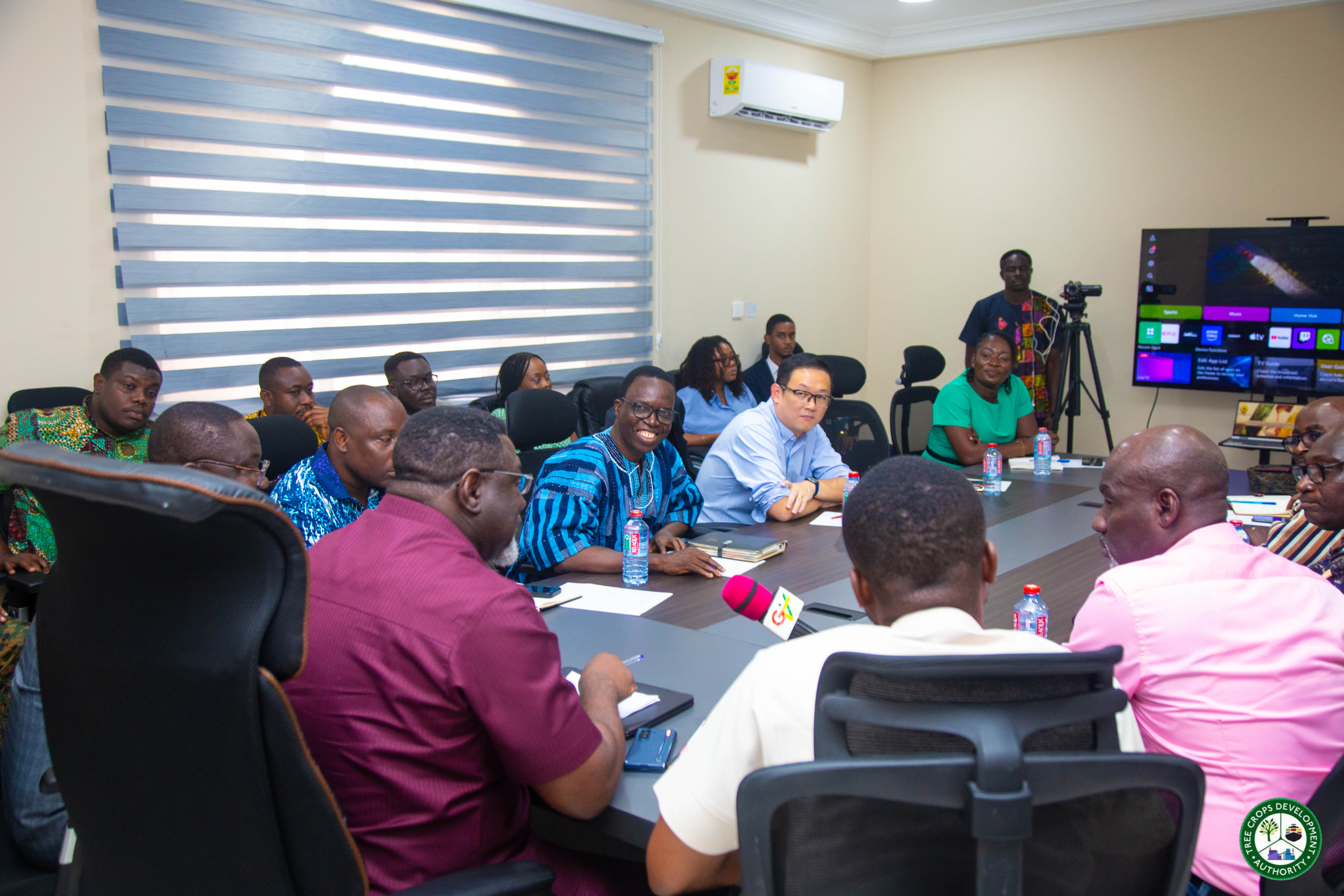
The Tree Crop Development Authority (TCDA), in collaboration with the Oil Palm Development Association of Ghana (OPDAG), organized a stakeholder engagement meeting to deliberate on the growing menace of illegal importation of vegetable oils into Ghana.
The engagement was held in line with Section 3(k)(i) of the Tree Crops Development Authority Act, 2019 (Act 1010), which mandates the Authority to advise Government and the private sector on issues relating to the development of the tree crops industry, including the import and export of tree crop produce and products.
The purpose of the meeting was to strengthen coordination among key regulatory and enforcement institutions, promote regulatory compliance, safeguard fair market practices, and protect the competitiveness of Ghana’s domestic oil palm industry.
The Chief Executive Officer of TCDA, Dr. Andrew Osei Okrah, gave the opening address. He outlined the core mandate of the Authority and highlighted the six key tree crops under its supervision—Cashew, Coconut, Rubber, Oil Palm, Shea, and Mango.
Dr. Okrah emphasized the economic and health implications of the illegal importation of vegetable oils and called for a multi-institutional approach to address the issue. He noted the urgent need to intensify public education on the provisions of Act 1010 and L.I. 2471 to promote awareness and compliance among industry players.
He further stressed the importance of:
• Developing a traceability and conveyance certification system for the oil palm value chain;
• Establishing a joint monitoring and enforcement task force to clamp down on illicit imports; and
• Ensuring the Judiciary strictly enforces sanctions to deter non-compliance.
Dr. Okrah also identified fragmentation of institutional roles and overlapping policies as key challenges to effective enforcement and called for stronger collaboration between regulatory and security agencies.
The President of the Oil Palm Development Association of Ghana, Mr. Paul Kwabena Amaning, delivered a comprehensive presentation on the state of Ghana’s oil palm sector and the impact of smuggling on local production.
He expressed serious concern about the increasing volumes of unregulated foreign vegetable oil flooding the Ghanaian market. Mr. Amaning cautioned that if immediate measures are not taken to curb the practice, it could collapse the local oil processing industry and result in the loss of over 900 jobs along the value chain.
He appealed to TCDA, the security agencies, and the Judiciary to support OPDAG’s efforts to protect the domestic market. He reiterated that strict enforcement and collaboration among stakeholders remain the only sustainable way to address the threat posed by illegal importation.
Following the main presentations, participants engaged in a robust discussion session. Key points raised included:
•The urgent need for coordinated institutional efforts to avoid duplication of roles;
•The necessity to increase public sensitization and awareness on import regulations and the legal requirements for trading in vegetable oils;
•The establishment of a Joint Enforcement Task Force composed of TCDA, National Security, Ghana Police Service, Ghana Immigration Service, Food and Drugs Authority (FDA), and Customs;
•Support for the digital traceability software under development by TCDA to enhance monitoring and compliance;
•The importance of harmonizing policies and institutional mandates to ensure efficiency in enforcement.
The meeting was attended by representatives from the following organizations and institutions:
•Tree Crop Development Authority (TCDA): Dr. Andrew Osei Okrah (CEO), Rev. Edwin Afari, Richard Kofi Kofituo, Michael Afari (IT), Yaw Agyei Agyepong (VCS/Oil Palm)
•National Security: Col. D.N.A. Quaye (Deputy Director, Operations)
•Ghana Shippers Authority: Prince Henry Ankra, Raymond Abulam, David Oren’s Boamah
•Oil Palm Development Association of Ghana (OPDAG): Mr. Paul Kwabena Amaning (President), Samuel Avaala (BOPP PLC), Kwabena Akwaboah
•Food and Drugs Authority (FDA): Gloria Anowa Ackon
•Ghana Immigration Service: DSI Amoako Danquah
•Ghana Police Service: ACP Sam (Operations, National Headquarters)
•Ghana Investment Promotion Centre (GIPC): Korantema Swatson Damptey
•Ghana Standards Authority: Elfreda O. Jones
•Judicial Service: Mandy Kwawukoma
•Ministry of the Interior: Dr. Gideon Armah Tetteh
•Wilmar Africa: Solomon Ohene Owusu, NG Eng Kiat
•Royvia Plus: Kofi Owusu Ampomah, Happy Forson
•Agro Board: Godfred Obeng
The following key outcomes were agreed upon:
1.Formation of a Joint Enforcement Task Force to clamp down on smuggling and illegal importation of vegetable oils.
2.Commitment of support from National Security, the Ghana Police Service, the Immigration Service, and the Judiciary for the proposed enforcement mechanism.
3.Strengthening of public education on TCDA Act 1010 and L.I. 2471 to ensure broader industry compliance.
4.Implementation of a digital traceability system by TCDA to monitor oil palm products and ensure transparency.
5.Improved inter-agency coordination and policy harmonization to streamline regulatory operations and enforcement.
The stakeholder engagement was highly successful and provided a valuable platform for policy dialogue and collaborative planning among key institutions.
The discussions reaffirmed the shared commitment of TCDA, OPDAG, and the participating agencies to safeguard the local oil palm sector from unfair competition and illegal trade practices.
The collective pledges made by National Security, the Ghana Police Service, Immigration Service, and the Judiciary to support enforcement efforts reflect a strong national will to protect the industry, create sustainable jobs, and promote compliance within the oil palm value chain.
The meeting ended with an agreement to maintain continuous stakeholder collaboration and to ensure that the outcomes translate into concrete enforcement actions.
Picture Gallery:
https://www.facebook.com/share/p/1F5mLcvk2x/?mibextid=wwXIfr